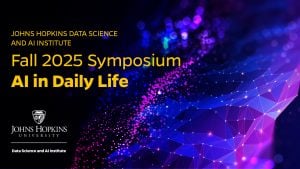
Join us for the Johns Hopkins Data Science and AI Institute Fall 2025 Symposium
AI in Daily Life
Tuesday, Sept. 16
Symposium | 1 to 4:15 p.m. | Shriver Hall Auditorium
Poster Session | 4:15 to 6 p.m. | Great Hall and Glass Pavilion
Join the Johns Hopkins Data Science and AI Institute this fall as we explore how artificial intelligence is reshaping everyday life. From sustainable computing to embodied AI and the future of work, discover how humans and AI can thrive together.
-
Agenda
-
Poster Session
-
Registration
Speakers
Benjamin Lee
Benjamin C. Lee is a professor of electrical and systems engineering and computer and information science at the University of Pennsylvania. He is also a visiting researcher at Google. Lee’s research focuses on computer architecture – including microprocessors, memory systems and data centers – as well as energy efficiency and sustainability. He uses machine learning and algorithmic economics to improve the design and management of computer systems. He completed postdoctoral research at Stanford University, earned a PhD from Harvard University, and received a bachelor’s degree from the University of California, Berkeley. He has also held visiting positions at Meta AI, Microsoft Research, Intel Labs, and Lawrence Livermore National Laboratory. He is an IEEE Fellow and ACM Distinguished Scientist.
John Tasioulas
John Tasioulas is a professor of ethics and legal philosophy at the University of Oxford and director of Oxford's Institute for Ethics in AI. He has written extensively on moral, legal, and political philosophy, as well as the philosophy of technology. He has served on AI and tech committees for the European Commission and the Greek government. With Josiah Obser, he is the author of “The Lyceum Project: AI Ethics with Aristotle.”
Axel Krieger
Axel Krieger is an associate professor in the Department of Mechanical Engineering at Johns Hopkins with a secondary appointment in the Department of Computer Science at Johns Hopkins. Krieger's research focuses on both the fundamental and translational development of novel tools, imaging, and robot control techniques for medical robotics. Specifically, he investigates methodologies that increase smartness and autonomy and improve image guidance of medical robots to perform previously impossible tasks, improve efficiency, and ultimately enhance patient outcomes. He is also a Carol Croft Linde Faculty Scholar.
Mathias Unberath
Mathias Unberath is the John C. Malone Associate Professor of Computer Science at Johns Hopkins University. He is the Research Director for Interactive and Embodied AI in the Data Science and AI Institute, core member of the Malone Center for Engineering in Healthcare and the Laboratory for Computational Sensing and Robotics, and a member of the Institute for Assured Autonomy. He holds secondary appointments in the School of Medicine and the School of Nursing. With his group - the Advanced Robotics and Computationally AugmenteD Environments (ARCADE) Lab - Unberath builds the future of AI-assisted medicine. Through synergistic research on imaging, computer vision, machine learning, and interaction design, he invents human-centered solutions that are embodied in emerging technology such as mixed reality and robotics.



